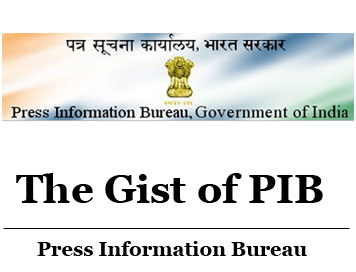(HOT) UPSC Current Affairs 2025 PDF
NEW! The Gist (JAN-2026) | E-BOOKS
(THE GIST OF PIB) National Food Security Act

(THE GIST OF PIB) National Food Security Act
[April-2022]
National Food Security Act
- For procurement operations under MSP and seamless distribution of foodgrain under Pradhan Mantri Garib Kalyan Ann Yojana (PMGKAY) and National Food Security Act 2013 (NFSA), during Financial Year 2021-22 Department of Food & Public Distribution released Rs.2,94,718/- Crore towards Food Subsidy to Food Corporation of India and State Governments.
About NFSA:
- The National Food Security Act, 2013 (NFSA) provides for food and nutritional security in the human life cycle approach, by ensuring access to adequate quantity of quality food at affordable prices for people to live a life with dignity and for matters connected therewith or incidental thereto.
- The Act is in line with Goal Two of the Sustainable Development Goals (which seeks sustainable solutions to end hunger in all its forms by 2030 and to achieve food security) set by the United Nations General Assembly.
- Schemes such as the Mid-Day Meal Scheme (MDM), the Public Distribution System (PDS), and the Integrated Child Development Services (ICDS) are included under the Act.
- The implementation of the scheme comes under the ambit of the Ministry of Consumer Affairs, Food and Public Distribution.
Key features:
- The Act legally entitled up to 75% of the rural population and 50% of the urban population to receive subsidized foodgrains under the Targeted Public Distribution System (TPDS).
- The eligible persons will be entitled to receive 5 Kgs of foodgrains per person per month at subsidised prices of Rs. 3/2/1 per Kg for rice/wheat/coarse grains. The existing Antyodaya Anna Yojana (AAY) households, which constitute the poorest of the poor, will continue to receive 35 Kgs of foodgrains per household per month.
- About two-thirds of the population, therefore, is covered under the Act to receive highly subsidized foodgrains.
- The Act also has a special focus on the nutritional support to women and children. Pregnant women and lactating mothers will be entitled to meals and maternity benefits of not less than Rs 6000.
- Children upto 14 years of age will be entitled to nutritious meals as per the prescribed nutritional standards. In case of non-supply of entitled foodgrains or meals, the beneficiaries will receive food security allowance.
- The Act also contains provisions for setting up of grievance redressal mechanism at the District and State levels
- The eldest women of the household of age 18 years or above will be the head of the household for the purpose of issuing ration cards.
Implementation:
- It is operated under the joint responsibility of the Central and the State/Union Territory (UT) Governments.
- The Central Government is responsible for procurement, allocation and transportation of food grains up to the designated depots of the Food Corporation of India.
- States/UTs hold the operational responsibilities for allocation and distribution of food grains.
- The NFSA currently covers 81 crore people which was determined on the basis of the 2011 census, and has not been revised since the law was passed in 2013.
CLICK HERE TO DOWNLOAD FULL PDF
CLICK HERE TO DOWNLOAD UPSC E-BOOKS
Study Material for UPSC General Studies Pre Cum Mains
Get The Gist 1 Year Subscription Online
Click Here to Download More Free Sample Material
<<Go Back To Main Page
Courtesy: PIB

